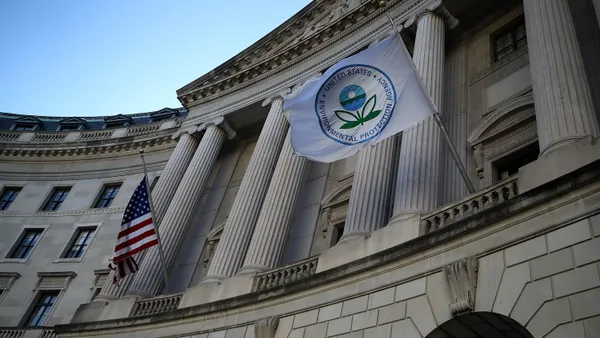Q2 Earnings
| Revenue | $3.74B |
| YoY Change | 1.6%▲ |
| YoY Recycling Revenue | $85M▼ |
CEO Jim Fish said during the latest earnings call that Waste Management's overall business is in "great health" and "outperforming even our own expectations." CFO Devina Rankin said that collection and disposal volume growth made for the "best single quarter cash from operations we have ever achieved" and full-year expectations have been raised.
Still, the recycling issue shows no sign of going away. Compared to April, when the topic was inescapable during a Q1 call and string of WasteExpo interviews, the tone this quarter seemed to indicate a new normal rather than a cause for panic among financial analysts.
Recycling:
- Waste Management is no longer assuming commodity prices, currently down by 43%, will recover this year or even early next year. The company is now budgeting for an approximately $100 million decline in YoY operating EBITDA as a result (double initial forecasts), but says about three-quarters of that is already behind it.
- Fish said a multi-pronged approach of raising processing costs, enacting more contamination fees and developing alternative markets was expected to help stabilize some of those costs. When asked about invoking force majeure for existing contracts, he said "it's not an option that we prefer."
- Looking ahead, executives were more confident about how this would play out in 2019. "...If we assume the commodity prices have come pretty close to bottoming out, then everything that we're doing, as I mentioned, will eventually become a tailwind for us," said Fish.
Focusing on an aspect of Waste Management's business that currently accounts for less than 9% of its revenue may seem counterintuitive to some, but as the largest recycling operation in North America, the company's perspective on this area will always carry weight.
Waste Management may only be shipping about 5% of its material to China now, but transport costs are higher for other countries and many commodity prices are still down. This has meant cost increases for commercial and municipal customers alike in states across the country. Some customers are willing to pay more or accept higher fees. Some aren't, and a handful have even canceled their programs when no other companies were available.
This raises a tricky question about just how far the company's commitment can be expected to go. As described by COO Jim Trevathan, Waste Management views recycling as "a service that our customers desire" but added that "our shareholders deserve an appropriate return on invested capital from our recycling assets in any economic climate."
Labor Moves:
Like the industry at large, Waste Management has struggled with labor shortages. Following the reduction of the corporate tax rate, the company announced plans for a $2,000 bonus that employees will receive at the end of this year. Additional retention initiatives were announced during the latest call.
- The company plans to build a second driver and technician training facility in the West to complement its existing Florida site. Fish said employees trained there have "markedly lower" turnover during their first year-and-a-half, but a lot of training still happens locally due to logistical constraints.
- Waste Management also announced an automated bulldozer pilot with Caterpillar at a Colorado landfill. Trevathan said the job currently has a 17% turnover rate, so this is seen as a way to potentially create new opportunities for "wounded service members" and "folks that may not otherwise be interested in working on the face of a landfill, but may be very interested in working in [an] air conditioned room sitting in front of some screens in a leather chair."
- New ways to optimize operations to keep up with continuous volume growth through more automation and onboard computing are also being explored. Rankin pointed to the fact that volumes were up by 3% during the second quarter, with route structure up by 1%, as a sign this was working.
Looking Ahead:
- Capital expenditures for the quarter were up by more than 45% due to ongoing fleet upgrades and "additional airspace needs," for a total of $836 million in 2018. This puts Waste Management on track to hit the high end of its $1.6-1.7 billion annual projected spend. M&A spending for the quarter was comparatively smaller — $21 million for five tuck-ins.
- Fish hinted at plans to increase returns on a network of the "best-positioned landfills and transfer stations in the industry." This could mean getting MSW pricing up from the current 2-3% range to as high as 3-5%.
- Free cash flow was up by $101 million YoY, thanks in large part to the corporate tax cut that put the company's effective rate at 18.1% this quarter. More than 90% of that has gone toward buybacks and dividends so far this year. They totaled $300 million and $200 million, respectively, during the second quarter.










